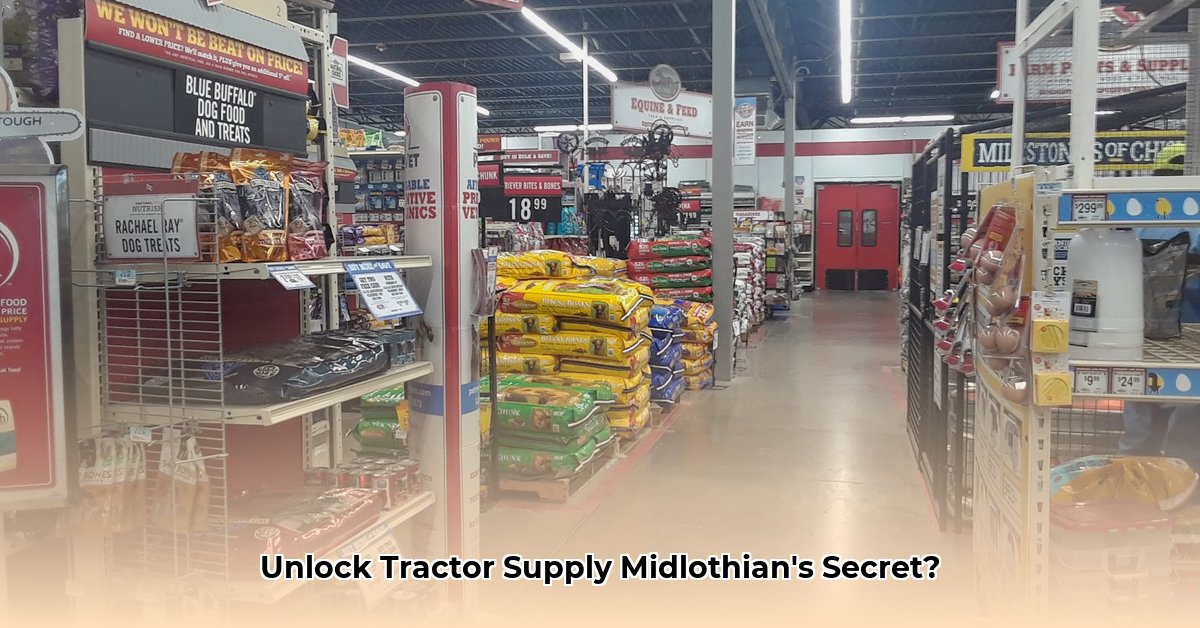
Tractor Supply Midlothian: A Community Hub Analysis
Tractor Supply Company (TSC) in Midlothian, Texas, serves as a vital resource for the local community, providing essential goods and services to farmers, ranchers, backyard gardeners, and pet owners. This analysis examines the store's strengths, weaknesses, and opportunities for growth, offering actionable recommendations for enhanced success. The Midlothian market, characterized by a blend of large-scale agricultural operations and a growing population of hobby farmers and pet owners, presents both challenges and opportunities for TSC. For more information on Tractor Supply Company, visit this helpful site.
Company Overview: Tractor Supply's Rural Retail Model
Tractor Supply Company operates on a business model focused on providing essential products and services to rural communities. Their target customer base encompasses a wide spectrum, from professional farmers requiring specialized equipment and supplies to hobbyists seeking gardening tools and pet supplies. This diverse customer base presents opportunities for TSC to expand its product offerings and strengthen its market position. However, failure to adapt to evolving consumer preferences and digital advancements poses a significant threat.
Midlothian Store Analysis: Strengths, Weaknesses, and Opportunities
This section delves into specific aspects of the TSC Midlothian location:
Product Range and Customer Segmentation
Tractor Supply Midlothian boasts a diverse product range, successfully catering to multiple customer segments. From bulk agricultural supplies for large farms to smaller items for home gardens and pets, the store's versatility is a key strength. This breadth of offering creates a strong foundation for continued growth, attracting a diverse customer base. However, a strategic review of inventory could further optimize product mix and enhance profitability. What percentage of current inventory is directly sourced from regional, sustainable producers? This question highlights the potential for expansion of sustainable product offerings.
Location and Accessibility: A Competitive Advantage
TSC Midlothian's strategic location provides convenient access for customers in Midlothian and the surrounding communities. This accessibility is a significant competitive advantage, driving customer traffic and fostering loyalty. The store's proximity to key demographics (farmers, residential areas) bolsters this advantage. Does the high foot traffic translate into higher sales per square foot compared to other TSC locations? This question highlights the need for a comparison to other company stores.
Customer Service: The Human Touch
Knowledgeable and friendly staff are crucial for customer satisfaction and loyalty. Well-trained staff adept at providing expert advice and guidance on products is a key differentiator. TSC Midlothian's reputation for excellent customer service must be maintained and enhanced. What percentage of customer feedback highlights positive interactions with store staff? This question demonstrates the importance of capturing customer feedback.
Online Presence: A Critical Weakness
The absence of a robust online presence represents a significant weakness. In today's digital age, online ordering, delivery options, and a user-friendly website are essential for competitiveness and convenience. The lack of these features limits the store's reach and potential customer base, hindering growth. How much potential revenue is TSC Midlothian losing each year due to the lack of an online presence? This highlights the need for a quantified assessment of this weakness.
Competition and Market Positioning
A detailed competitive analysis is crucial. Identifying competitors' strengths and weaknesses will allow TSC Midlothian to pinpoint areas for differentiation and competitive advantage. What strategies are employed by other feed and supply stores in the Midlothian area, and how can TSC Midlothian differentiate itself? This underscores the need for more data on competitors.
Sustainability: A Growing Market Opportunity
Increasing consumer demand for sustainable products presents a significant opportunity. Offering eco-friendly and ethically sourced products can attract environmentally conscious customers and enhance the store's image. What percentage of customers would be willing to pay a premium for sustainably sourced products? This helps quantify potential market demand.
Stakeholder Analysis: Needs and Concerns
The success of TSC Midlothian depends on satisfying the needs of various stakeholders:
- TSC Management: Prioritizes profitability, market share growth, and brand reputation.
- Local Farmers: Require reliable supply chains, competitive pricing, and expert advice.
- Backyard Gardeners: Seek quality products, accessible resources, and community engagement.
- Pet Owners: Value high-quality products, convenience, and potentially veterinary services.
Actionable Recommendations: A Roadmap for Growth
The following recommendations are categorized into short-term and long-term goals:
Short-Term (0-6 Months):
- Develop a basic e-commerce website with online ordering and in-store pickup. (Target: 90% website functionality within 3 months)
- Conduct a thorough competitive analysis of local feed and supply stores. (Target: Completed analysis within 2 months)
- Implement a customer feedback collection system to assess customer satisfaction. (Target: 80% customer response rate within 6 months)
- Introduce a small selection of sustainably sourced products. (Target: 15% increase in sustainable product offerings in 3 months)
Long-Term (12-24 Months):
- Develop a comprehensive digital marketing strategy. (Target: 20% increase in website traffic within 1 year)
- Launch a customer loyalty program. (Target: 30% increase in repeat customers within 1 year)
- Expand the range of sustainably sourced products. (Target: 50% increase in sustainable product offerings within 2 years)
- Partner with local farmers and producers to offer local, sustainably sourced produce. (Target: Establish partnerships with at least 3 local farmers within 1 year)
- Implement staff training programs focused on product knowledge and customer service. (Target: 100% of staff complete training within 6 months)
Conclusion: Adapting for Long-Term Success
The continued success of Tractor Supply Midlothian hinges on its ability to adapt to changing consumer demands, embrace digital advancements, and prioritize stakeholder needs. By implementing the recommendations outlined above, TSC can solidify its position as a community hub and achieve sustainable growth. Continuous monitoring and adaptation to the evolving market is essential for long-term success.